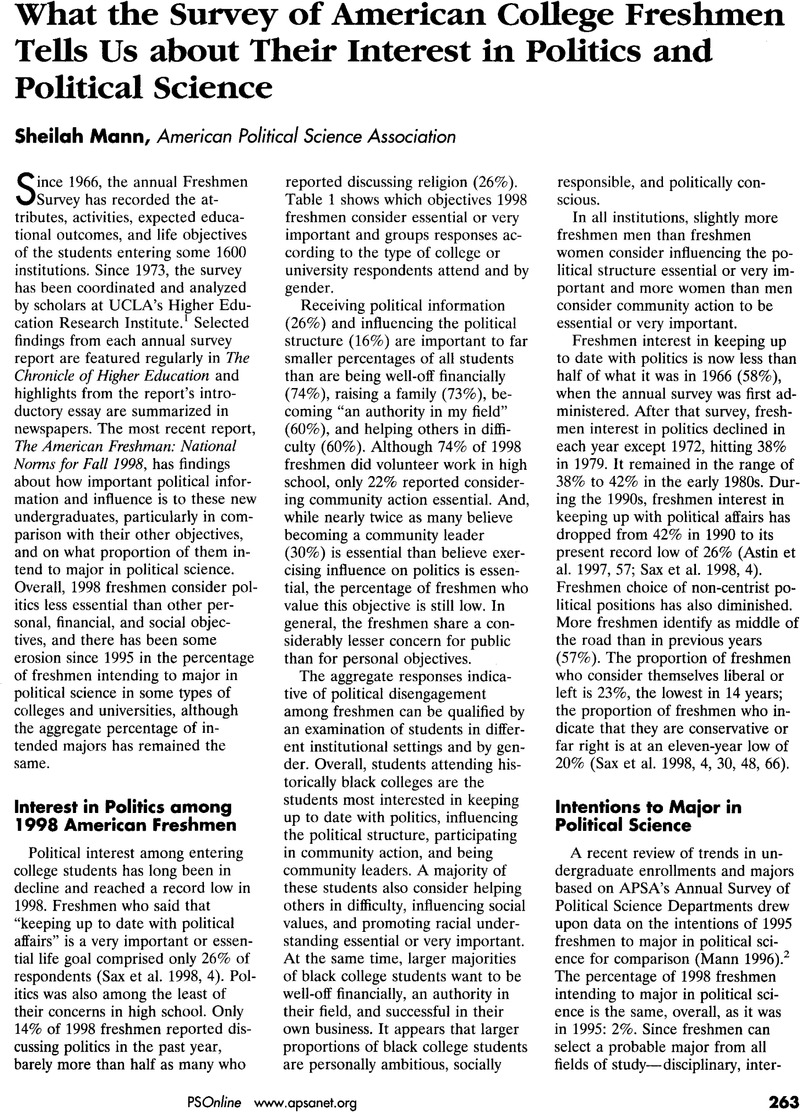Crossref Citations
This article has been cited by the following publications. This list is generated based on data provided by Crossref.
May, Vaughn
2000.
Politics, Internet Assignments, and Civic Knowledge.
College Teaching,
Vol. 48,
Issue. 2,
p.
43.
Patterson, Amy S.
2000.
It's a Small World: Incorporating Service Learning into International Relations Courses.
PS: Political Science & Politics,
Vol. 33,
Issue. 4,
p.
817.
Jones, Steven
2002.
What's at Stake in the Civic Education Debate?.
Politics & Policy,
Vol. 30,
Issue. 3,
p.
563.
Huerta, Juan Carlos
2004.
Do Learning Communities Make a
Difference?.
PS: Political Science & Politics,
Vol. 37,
Issue. 2,
p.
291.
Gorham, Eric
2005.
Service-Learning and Political Knowledge.
Journal of Political Science Education,
Vol. 1,
Issue. 3,
p.
345.
Lay, J. Celeste
and
Smarick, Kathleen J.
2006.
Simulating a Senate Office: The Impact on Student Knowledge and Attitudes.
Journal of Political Science Education,
Vol. 2,
Issue. 2,
p.
131.
Smith, Elizabeth S.
2006.
Learning about Power through Service: Qualitative and Quantitative Assessments of a Service-Learning Approach to American Government.
Journal of Political Science Education,
Vol. 2,
Issue. 2,
p.
147.
Perry, Anthony D.
and
Wilkenfeld, Britt S.
2006.
Using an Agenda Setting Model to Help Students Develop & Exercise Participatory Skills and Values.
Journal of Political Science Education,
Vol. 2,
Issue. 3,
p.
303.
O'Connor, Karen
and
Yanus, Alixandra B.
2009.
The Chilly Climate Continues: Defrosting the Gender Divide in Political Science and Politics.
Journal of Political Science Education,
Vol. 5,
Issue. 2,
p.
108.
Teten, Ryan Lee
2010.
When in Rome, Do as Jon Stewart Does: UsingAmerica: The Bookas a Textbook for Introductory-Level Classes in American Politics.
Journal of Political Science Education,
Vol. 6,
Issue. 2,
p.
163.
Arbour, Brian K.
Karras, Andreas
and
Lee, Ernest
2010.
Large Lecture Sections: An Experiment Test of Their Effectiveness.
SSRN Electronic Journal,
Teten, Ryan Lee
2011.
Mouthpiece of the Liberal Left?.
Public Integrity,
Vol. 14,
Issue. 1,
p.
67.
Yanus, Alixandra B.
O'Connor, Karen
and
Weakley, Jon L.
2012.
Mind the Gap: Political Science Education in Community Colleges.
Community College Journal of Research and Practice,
Vol. 36,
Issue. 9,
p.
684.
McInerney, Chris
and
Adshead, Maura
2013.
Problem-Based Learning and Civic Engagement—Shifting the Focus of Learning in Public Policy Education.
PS: Political Science & Politics,
Vol. 46,
Issue. 03,
p.
630.
Clementson, David E.
Pascual‐Ferrá, Paola
and
Beatty, Michael J.
2016.
When Does a Presidential Candidate Seem Presidential and Trustworthy? Campaign Messages Through the Lens of Language Expectancy Theory.
Presidential Studies Quarterly,
Vol. 46,
Issue. 3,
p.
592.
Eckstein, Katharina
2017.
Handbuch Entwicklungs- und Erziehungspsychologie.
p.
1.
Eckstein, Katharina
2019.
Handbuch Entwicklungs- und Erziehungspsychologie.
p.
405.
Marineau, Josiah Franklin
2020.
What is the Point of a Political Science Degree?.
Journal of Political Science Education,
Vol. 16,
Issue. 1,
p.
101.
Mazzei, Julie
Barnes, Andrew
Roy, Oindrila
and
Poluse, George
2022.
Kids Today: They Care, But They Don’t Think We Do.
Journal of Political Science Education,
Vol. 18,
Issue. 4,
p.
536.
Antkowiak, Laura S.
2024.
Who Substitutes Service for Politics? Assessing the Roles of Youth and Partisan Alienation in Americans’ Forms of Civic Engagement.
Political Research Quarterly,
Vol. 77,
Issue. 1,
p.
89.



